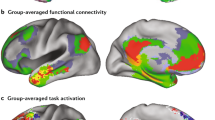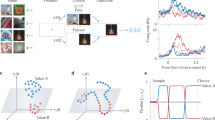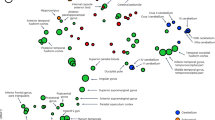Abstract
Much debate has surrounded the interpretation of the well known ‘split brain’ syndrome, produced by section of the corpus callosum in man [for useful surveys of early studies of the effects of callosal damage (for example by Liepmann (1900), Goldstein (1908) and Bonhoeffer (1914)) see refs 1–3]. On the basis of the observation that left and right half-systems can find themselves in conflict when disparate instructions are flashed to left and right visual hemifields, Sperry4has described such patients as having “two free wills inside the same cranial vault”. MacKay7–9, among others, has argued for a more parsimonious interpretation of the available evidence, suggesting that it demonstrates duality only at the ‘executive’ level where continuous goal-pursuit is administered, rather than at the ‘normative’ supervisory level where the agent's priorities and criteria of evaluation are themselves subject to evaluation and revision. We report here some experiments in which a split-brain patient showed considerable capacity for explicit interhemispheric exchange of information and instructions, yet gave no sign of the duality of supervisory initiative that might have been expected on the hypothesis of ‘two free wills’.
This is a preview of subscription content, access via your institution
Access options
Subscribe to this journal
Receive 51 print issues and online access
$199.00 per year
only $3.90 per issue
Buy this article
- Purchase on Springer Link
- Instant access to full article PDF
Prices may be subject to local taxes which are calculated during checkout
Similar content being viewed by others
References
Geschwind, N. Brain 88, 584–644 (1965).
Zangwill, O. L. in Hemisphere Function in the Human Brain (eds Dimond S. J. & Beaumont, J. G.) (Eleck Science, London, 1974).
Joynt, R. J. in Hemispheric Disconnection & Cerebral Function (eds Kinsbourne, M. & Smith W. L.) (Thomas, Springfield, 1974).
Sperry, R. W. in Brain & Conscious Experience (ed. Eccles, J. C.) 293–313 (Springer, New York, 1966).
Gazzaniga, M. S. The Bisected Brain (Appleton-Century-Crofts, New York, 1970).
Gazzaniga, M. S. & LeDoux, J. E. The Integrated Mind (Plenum, New York, 1978).
MacKay, D. M. in Brain & Conscious Experience (ed. Eccles, J. C.) 312–313 (Springer, New York, 1966).
MacKay, D. M. in Consciousness and the Physical World (eds Josephson, B. D. & Ramachandran, V. S.) 95–113 (Pergamon, Oxford, 1980).
MacKay, D. M. Neural Communication and Control (eds Székely, G. Lábos, E. & Damjanovich, S.) 315–332 (Pergamon, Oxford and Akadémiai Kiado, Budapest, 1981).
Gazzaniga, M. S. Am. Scient. 60, 311–317 (1972).
Wilson, D. H., Reeves, A. & Gazzaniga, M. S. Neurology 28, 649 (1978).
Sidtis, J. J., Volpe, B. T., Holtzman, J. D., Wilson, D. H. & Gazzaniga, M. S. Science 212, 344–346 (1981).
Gazzaniga, M. S. Scient. Am. 217, 24–29 (1967).
Author information
Authors and Affiliations
Rights and permissions
About this article
Cite this article
MacKay, D., MacKay, V. Explicit dialogue between left and right half-systems of split brains. Nature 295, 690–691 (1982). https://doi.org/10.1038/295690a0
Received:
Accepted:
Issue Date:
DOI: https://doi.org/10.1038/295690a0
This article is cited by
-
Split-Brain: What We Know Now and Why This is Important for Understanding Consciousness
Neuropsychology Review (2020)
-
How to count people
Philosophical Studies (2011)
-
Long latency evoked potentials in a case of corpus callosum agenesia
The Italian Journal of Neurological Sciences (1994)
-
Unified response to bilateral hemispheric stimulation by a split-brain patient
Nature (1983)
Comments
By submitting a comment you agree to abide by our Terms and Community Guidelines. If you find something abusive or that does not comply with our terms or guidelines please flag it as inappropriate.



